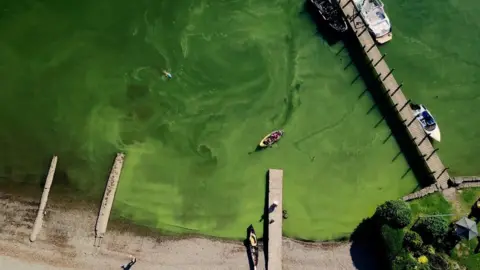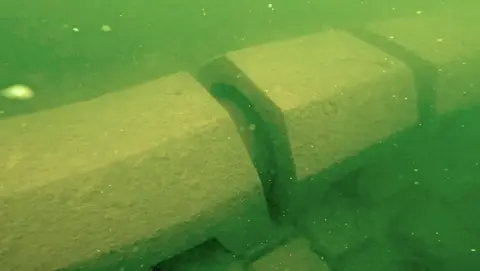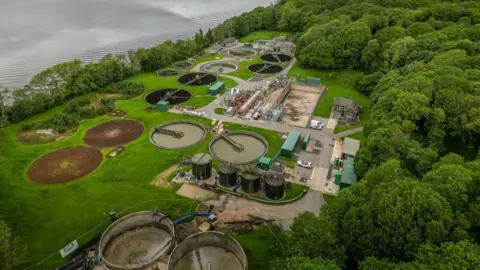Sewage dumped illegally in Windermere over 3 years
 Getty Images
Getty ImagesA water company repeatedly dumped millions of litres of raw sewage illegally into one of England's most famous lakes over a three-year period, the BBC can reveal.
More than 140 million litres of waste were pumped into Windermere between 2021 and 2023 at times when it was not permitted, our analysis shows, and United Utilities failed to report most of it.
It means the company's illegal dumping of sewage into the lake went on for far longer, and was far more extensive, than was previously known.
United Utilities said some of its sewage releases into Windermere were "potentially non-compliant" but that it self-reports "over 94% of potential pollution incidents to the Environment Agency".
Matt Staniek, a campaigner against sewage pollution and founder of Save Windermere, said Windermere was “the jewel in the crown of the Lake District National Park, and it's being used as an open sewer”.
It is sometimes necessary to release sewage into rivers and lakes to stop the wastewater system from being overwhelmed by heavy rain but this pollution can damage the environment, causing harmful algal blooms and even killing fish.
In January this year - after BBC Panorama revealed the company had downplayed the severity of dozens of pollution incidents, some involving Windermere - United Utilities retrospectively reported some discharges into the lake from October 2023 onwards.
But since then the BBC has obtained United Utilities operations data going back to January 2021 which shows that illegal discharges had been taking place for more than three years, far longer than the discharges in the four months the company retrospectively reported.
The data involved Glebe Road pumping station in Bowness-on-Windermere, the only site which discharges directly into the lake, which is designed to pump wastewater from the local area to the nearby sewage works for treatment.
 Save Windermere
Save WindermereIt is authorised by the Environment Agency to release raw sewage into the lake in certain circumstances during wet weather, as long as it is pumping at least 245 litres of sewage a second to the treatment works.
That condition, written in the site’s environmental permit, is supposed to protect Windermere and ensure that, even in wet weather, most sewage is sent for treatment. Failing to comply with the permit is a criminal offence.
The BBC analysed data detailing the flow of sewage through the station and the times when waste had been dumped into the lake. We found the station had failed to comply with the permit by discharging sewage into the lake at times when it had not been pumping the required amount for treatment.
As a result, sewage which should have been sent for treatment was dumped into the lake.

Permit breaches should be reported to the Environment Agency, but United Utilities failed to do this for most of the discharges identified by the BBC between the start of 2021 and the end of 2023.
In those three years, we found that United Utilities illegally pumped sewage into Windermere for 165 hours, of which at least 118 hours was not reported to the environmental regulator.
We were able to calculate the volume of the sewage released because it was dumped into the lake using either one or two dedicated pumps, each of which operates at 240 litres per second.
This means that between 143 million and 286 million litres was illegally dumped in the lake, depending how often both pumps were operating.
United Utilities failed to report at least 102 million litres of that pollution.
 Getty Images
Getty ImagesThe water company declined to provide the BBC with the data showing exactly when each of the pumps into the lake was operating, claiming this data is classed as "internal communications", which did not have to be disclosed under environmental information regulations.
Mr Staniek, the anti-sewage campaigner, said the failure to report the illegal dumping was “totally and utterly outrageous”, adding that: “Windermere is so culturally significant to the entire nation this isn't just about a local issue.”
He said: “Part of the permit is to ensure that they are complying and that they’re analysing the data so they’re either incompetent or they knew about this and they profited from it and it’s Windermere that suffered. And I think it’s the latter.
'Under-resourced and incompetent'
United Utilities insiders told the BBC the company would have known that it was illegally discharging sewage because alarms and internal reports alert staff when treatment works or pumping stations are failing to comply with their discharge permits.
"We would have been aware of the issue – it would have flagged up on flow and spill reports. I’m not surprised we haven’t reported it," one said.
"We work on a risk management basis and we’ll have judged the risk of the EA finding out and understanding the permit breach would be minimal as they are under-resourced and incompetent."
United Utilities told us it is committed “to being fully transparent” with the Environment Agency.
A spokesperson said as part of ongoing work to reduce spills in 2024 the company discovered a "technical issue in the configuration of the Windermere system" which meant that some of the discharges from the Glebe Road pumping station were "potentially non-compliant".
The company has "implemented system changes to prevent a reoccurrence", the spokesperson said.

United Utilities also said it is starting construction on additional storage and treatment facilities around Windermere, to reduce sewage discharges.
Water companies are judged on the number of pollution incidents they cause each year by the water industry regulator Ofwat and financially rewarded or penalised on their performance.
Environment Agency guidance about calculating the number of illegal discharges during repeated incidents is not clear. So the BBC has treated all illegal discharges within 24 hours of each other as just one “minor” incident, with subsequent incidents only being recorded after a 24-hour period with no illegal dumping.
Using this method, we calculated that illegal discharges we identified could account for 24 extra pollution incidents.
That would mean if the incidents identified by the BBC had been officially reported, it would have cost the company just over £2.5m.
'Furious and sickened'
United Utilities told the BBC that any potentially non-compliant discharges were reported to the Environment Agency "as soon as we became aware of them".
Therefore, the company said, it did not benefit from any unjust rewards from Ofwat.
United Utilities only finally reported most of the other discharges earlier this month, after being approached by the BBC and following a request from the Environment Agency.
The company did not answer the BBC’s questions about why it had failed to identify and report those discharges at the time they occurred.
Ofwat told the BBC: "The allegations made against United Utilities in terms of environmental failures and under-reporting of pollution incidents are very serious and where evidence supports further action, we will not hesitate to use all the powers at our disposal."
The water regulator told the BBC if a water company is found in breach of its obligations, any unjust rewards can be clawed back later through lower bills.
It is not the first time that United Utilities’ pumping station on the edge of Windermere has come under scrutiny.
Earlier this year BBC News reported millions of litres being illegally discharged in one night due to a communications fault and last year BBC Panorama revealed how both United Utilities and the Environment Agency had been downgrading significant pollution incidents to "no impact".
The Environment Agency said in a statement it had launched a "complex and ongoing" investigation into the sewage discharges from October 2023 onwards that were retrospectively reported by United Utilities, and it was examining further evidence received from the company.
"If any water company is found to be in breach of an environmental permit, the Environment Agency will take the appropriate enforcement action, up to and including a criminal prosecution," the agency said.
However, the BBC has learned that in the first eight months of the investigation the agency failed to obtain the crucial operational data needed to uncover illegal pollution in 2023 - data which was obtained and analysed by the BBC.
The Environment Agency has now confirmed it has this data. Told about the BBC’s analysis showing that the illegal pollution appears to have occurred for more than two years before the period being investigated, the agency said it will now review the evidence and scope of the criminal investigation.
During the election campaign, the now Prime Minister Sir Keir Starmer said he was "furious and sickened" to hear the BBC’s earlier revelations about sewage pumped illegally into Windermere and promised "severe and automatic fines that no water companies can ignore".
Environment Secretary Steve Reed said it was "disgusting that somewhere as beautiful as Lake Windermere is swilling with raw sewage" but said the government is already taking action, introducing legislation to ban polluting bosses from receiving bonuses or even send them to prison.
Tim Farron, Liberal Democrat MP, told BBC Radio 4 Today that he was "personally very angry with United Utilities because they have let down the [hospitality and tourism] industries".
"What we have here is either incompetence or something far worse. And yet, you’ve got the Environment Agency on the one hand and Ofwat on the other, who are not able to make them comply."
When pressed further on what "something far worse" could mean, Farron responded: "I think this implies the complete failure of regulation in the water industry.
"You’ve got water companies that are so powerful, they can just play the two regulators off against each other."
United Utilities was recently given permission by Ofwat to raise bills to claim an extra £33.2m in profit as a reward for its 2023 performance, while the Environment Agency awarded the company the top 4* environmental rating earlier this year.

Sign up for our Future Earth newsletter to get exclusive insight on the latest climate and environment news from the BBC's Climate Editor Justin Rowlatt, delivered to your inbox every week.
Outside the UK? Sign up to our international newsletter here.
